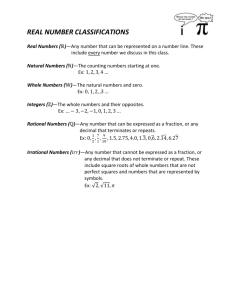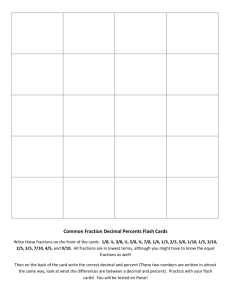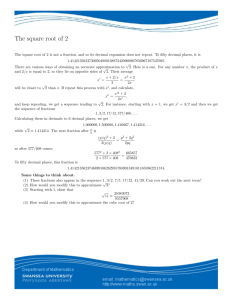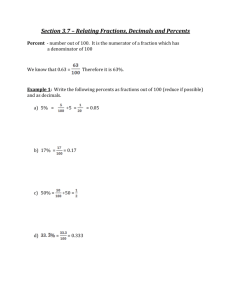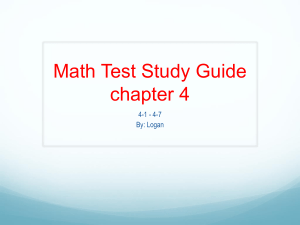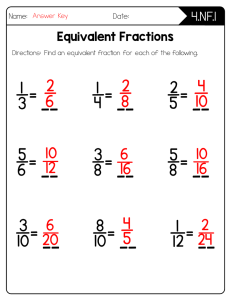From 06-07 DPI 4th grade indicators
advertisement
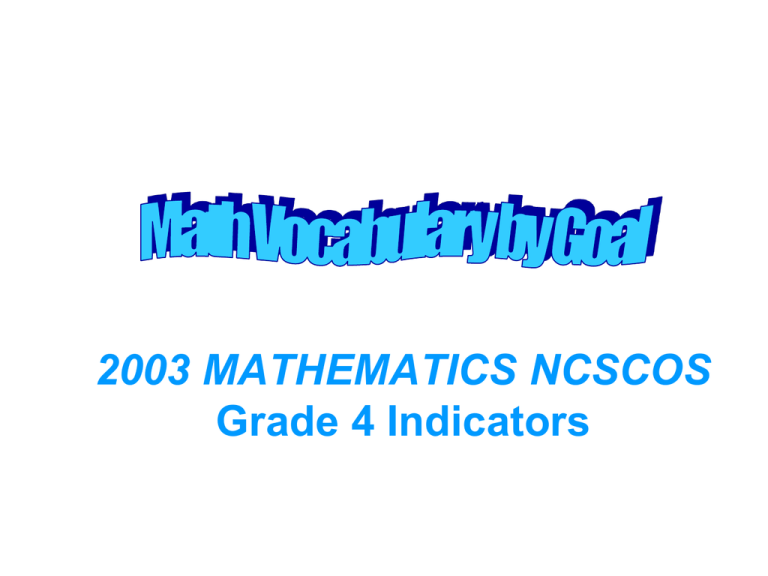
2003 MATHEMATICS NCSCOS Grade 4 Indicators The learner will read, write, model, and compute with nonnegative rational numbers. A real number that can be written as a positive or (negative) whole number, fraction, or decimal. Rational Number Expanded notation form Picture Form 300+20+6 Forms of Numbers Three hundred twenty-six Written Form 1,111 326 Standard form http://www.aaamath.com/plc31d-placevalue-add.html The position of a single digit in a whole number or decimal number containing one or more digits. ten thousands hundreds ones hundredths 45,305.79 thousands tens tenths Place Value http://mrsbogucki.com/aemes/resource/apps/placeval/placeval.htm Symbols used to determine relationships of equalities. .5 = .50 ? < .5 .30 = .300 equal to .5 =.05 .3 = .003 ? =.1,.2,.3,.4,or .5 less than or equal to not equal to Equal to/not equal to http://www.studyzone.org/testprep/math4/k/greaterlessthanl.cfm Equal parts of a whole or group written with a numerator and a denominator. 3 -Numerator 7 -Denominator Fraction http://math.rice.edu/~lanius/fractions/ Denominator: number of parts 3 4 Numerator: number of each part Fractions 7 3 Improper fraction Whole number 1 2 2 fraction mixed number http://www.visualfractions.com/MixtoFrCircle.html Fractions that are the same or equal Equal Portions 1/2 = 3/6 Equivalent Fractions http://www.learningplanet.com/sam/ff/index.asp http://www.shodor.org/interactivate/activities/fracsorter/index.ht ml A fraction written as a decimal Decimal Fraction http://www.amblesideprimary.com/ambleweb/mentalmaths/frac to.html Numbers written in standard form to show a value less than 1. .1 one-tenth .01 one-hundredth Decimal http://www.321know.com/cmp42bx2.htm The middle number in a set of data; must put numbers in order from least to greatest first. 93, 84, 97, 98, 100, 78, 86, 100, 85, 92 78, 84, 85, 86, 92, 93, 97, 98, 100, 100 78, 84, 85, 86, 92, 93, 97, 98, 100, 100 92 + 93 = 185 185 / 2 = 92.5 92.5 Median http://regentsprep.org/Regents/math/mean/Pmeasure.htm The number that occurs most in a set of data. 56, 66, 68, 73, 44, 62, 73, 44, 89, 55, 41, 73 41, 44, 44, 55, 56, 62, 66, 68, 73, 73, 73, 89 41, 44, 44, 55, 56, 62, 66, 68, 73, 73, 73, 89 73 Mode Subtract the smallest number from the largest number in a set of data. 89, 73, 84, 91, 87, 77, 94 73, 77, 84, 87, 89, 91, 94 94 – 73 = 21 21 Range http://www.quizville.com/range.php The likelihood that an event will happen What color did the spinner land on? Was this one of the favorable choices? Were there equal chances for both colors? Probability http://www.mathgoodies.com/lessons/vol6/intro_probability.html Resources • Web resources are listed at the bottom of each slide. • Additional resources: – NCDPI Math Glossary • http://community.learnnc.org/dpi/math/archives/Glo ssarySP.pdf – Houghton Mifflin Math http://www.eduplace.com/kids/hmm/g_4.html
